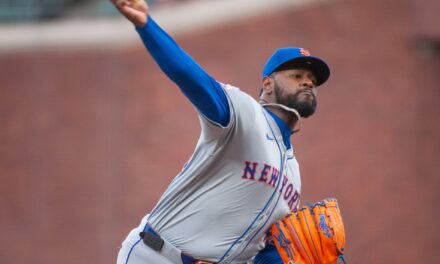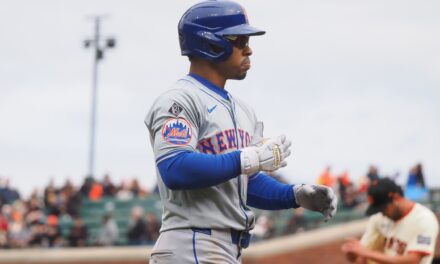
Mandatory Credit: Andy Marlin-USA TODAY Sports
Many assumed that Taijuan Walker – firmly planted towards the back end of the Mets’ rotation, even after an All-Star Game appearance in 2021 – might open the season on the injured list given the shortened spring training schedule and his ongoing recovery from his January knee surgery.
Yet there Walker was on the Citizens Bank Park mound on Monday night, making his first appearance of the 2022 season, despite leaving his final spring training start after only two innings when he experienced soreness in that surgically repaired knee. Walker’s availability and reliability are of critical importance to a Mets team already down one ace for an extended period and monitoring the status of their other ace, whose hamstring was barking just last week.
For two innings, Walker looked the part of an All-Star. The excitement was short lived, however, as Walker gave way to David Peterson to start the third inning. Walker was seen between the second and third innings putting on his warmup jacket and walking down the dugout tunnel with a trainer. It was later announced that Walker left the game early, due not to the aforementioned knee issue, but instead “right shoulder irritation.”
The Mets would go on to lose the game 5-4 in frustrating fashion, after the bullpen trio of Trevor May, Joely Rodriguez and Seth Lugo combined to surrender 5 runs to the Phils’ in the bottom of the eighth inning. May also left the game injured.
Walker looked brilliant through his two innings, during which no Phillies reached base. Walker struck out lefty sluggers Kyle Schwarber and Bryce Harper as part of a first inning that saw him touch 94.9 mph with his fastball and throw several great splitters. Walker punched out righty slugger Nick Castellanos on another nice splitter to begin the second before getting Didi Gregorius swinging to end another clean inning in the second.
The righty mixed his pitches extremely evenly, throwing 11 four-seam fastballs, 10 sliders and nine splitters. Phillies hitters swung at 14 of Walkers 30 pitches, and whiffed nine times for a ridiculous 64% whiff rate in an admittedly tiny sample size. Walker’s fastball averaged 93.7 mph, down 0.8 mph from last year’s average, which is perhaps unsurprising given that Walker is only three months removed from surgery.
Walker sounded unconcerned speaking to reporters after the game. After his shortened outing, Walker said that he left the game “to be safe,” because his shoulder “just didn’t feel right.” “It’s already feeling better now, but going to go for an MRI tomorrow to see what we’re dealing with.”
Buck Showalter echoed to reporters that Walker felt that the injury was not serious, but cautioned that “you don’t really know until you get in there and look” with an MRI.
Whether Walker’s irritated shoulder will sideline him for a significant amount of time remains to be seen. What is clear, though, is that it will be tough for the Mets to rely on Walker to provide length and quality, at least for the time being, given how banged up he is.
Overshadowed by the frustrating loss was a valiant effort by the left-handed Peterson, who pitched 4.0 scoreless innings in relief of Taijuan Walker ahead of the aforementioned bullpen trio who let the lead slip away. In his 4 innings, Peterson allowed three hits, walked two batters and struck out three more. Peterson struggled a bit with control, as only 32 of his 58 pitches registered as strikes, but Showalter made sure to highlight the big southpaw’s performance after the game. “I try not to let what happened at the end overshadow what a great job Peterson did. If we had won that game, it would have been on Peterson’s shoulders.”
Digging deeper, there were intriguing signs that Peterson may be ready to put last year’s struggles behind him. To start, Peterson threw a whopping 20 changeups among his 58 pitches, to go along with 15 4-seam fastballs, 14 sinkers and nine sliders. The velocity on each of those pitches were more or less in line with last years numbers, with the slider showing the biggest velocity variation from last years number at 1.2 mph slower than his average slider in 2021. Of note, Phillies hitters offered at Peterson’s slider four times and whiffed on each. Most interestingly, the spin rates on Peterson’s fastball, sinker and slider were up an average of 45, 43 and 78 RPM from last season. If Peterson can improve the life on those offerings and sustain these spin rates moving forward, it could bode well for his chances to contribute consistently to the Mets’ pitching staff in 2022, which sure looks like it could use all the help it can get for the time being.















